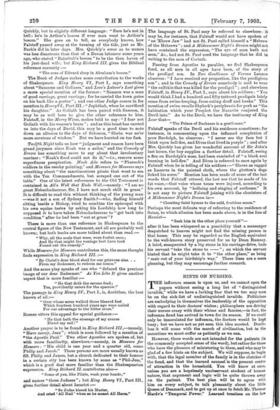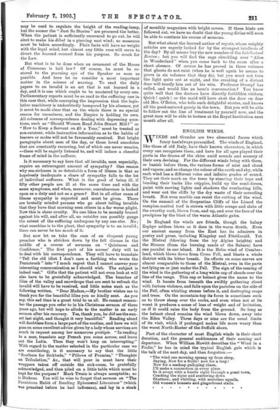HINTS ON NURSING.
rinfluenza season is upon us, and we cannot open the papers without seeing a long list of "distinguished invalids," while we have a lurking fear that we too may soon be on the sick-list of undistinguished invalids. Politicians are embodying in themselves the leadership of the opposition with regard to their doctors' wishes; philosophers are driving their nurses crazy with their whims and fancies,‚ÄĒin fact, the influenza fiend has arrived in town for its season. If we could only be innoculated for influenza, the doctors would be kept busy; but we have not as yet seen this idea mooted. Doubt- less it will come with the march of civilisation, but in the meantime we must suffer as patiently as we can.
However, these words are not intended for the patients (in the commonly accepted sense of the word), but rather for those who have the pleasure of ministering to them, and who may be glad of a few hints on the subject. We will suppose, to begin with, that the legal member of the family is in the clutches of the fiend, and that the learned counsel is the present centre of attraction in the household. You will know at once, unless you are a hopelessly unobservant student of human nature, that argument and logic will be quite thrown away on the patient. The best plan will be to agree with him on every subject, to talk pleasantly about the little Queen of Denmark, and to get up at once to fetch Mr. Thomas Hardy's "Temporal Power." Learned treatises on the law may be used to regulate the height of the reading-lamp, but the sooner the "Just So Stories" are procured the better. When the patient is sufficiently recovered to go out, he will elect to make his debut in a piercing east wind ; so measures must be taken accordingly. Plain facts will have no weight with the legal mind, but almost any little ruse will serve to divert the learned counsel from his purpose. So much for the Law.
But what is to be done when an ornament of the House of Commons is laid low ? Of course, be must be re- stored to the yearning eye of the Speaker as soon as possible. And here let us consider a most important matter in the science of nursing. To read the daily papers to an invalid is an art that is not learned in a day, and it is one which ought to be mastered by every one. Parliamentary reports must be so read to the suffering one in this case that, while conveying the impression that the legis- lative machinery is undoubtedly hampered by his absence, yet it must be made clear that on the whole there is no special reason for uneasiness, and the Empire is holding its own. All columns of correspondence dealing with depressing ques- tions, such as "Should Women Read John Stuart Mill ? " or "How to Keep a Servant on ¬£5 a Year," must be treated as non-existent, while instructive information as to the habits of beavers or moles will not be favourably received. But bright paragraphs about men of the day, or those loved anecdotes that are constantly recurring, but of which one never wearies, ‚ÄĒthese will be eagerly listened to, and will induce a cheerful frame of mind in the sufferer.
Is it necessary to say here that all invalids, men especially, require an extravagant amount of sympathy ? One reason why sea-sickness is so detestable a form of illness is that so hopelessly inadequate a share of sympathy falls to the lot of individual sufferers. What is the good of being ill, if fifty other people are ill at the same time and with the same symptoms, and when, moreover, convalescence is looked upon as a duty and not as a grace ? But in all other cases of illness sympathy is expected and must be given. There are brutally minded persons who go about telling invalids that they have that morning seen others in a far worse plight. Now this is sheer cruelty. No one likes to be morally braced against his will, and after all, no outsider can possibly gauge the extent of the suffering undergone by any one else. No; what sunshine is to the plant, that sympathy is to an invalid ; there can never be too much of it.
But now let us take the case of an eloquent young preacher who is stricken down by the fell disease in the middle of a course of sermons on " Quietness and Confidence." The first part of his nurses' duty will be to deal with his correspondence. They will have to translate "Tell the old idiot I don't care a farthing who wrote the Pentateuch" into "I much regret that I cannot answer your interesting communication as I should wish. The subject is indeed vast." Gifts that the patient will not even look at will also have to be gratefully acknowledged. The bunches of lilies of the valley and snowdrops that are sent to refresh the invalid will have to be received, and little notes such as the following written. "Dear Madam,‚ÄĒMy brother wishes me to thank you for the beautiful lilies you so kindly sent. As you say, this sad time is a great trial to us all. He cannot remem- ber the passage you refer to in his Christmas sermon of three years ago, but will hope to allude to the matter in an early sermon after his recovery. Yes, thank you, he did see the sun- set last night, and thought it very beautiful." Reading aloud will doubtless form a large part of the routine, and here we will pass on some excellent advice given by a lady whose services are much in request among her numerous proteges. "In reading to a man, translate any French you come across, and leave out the Latin. Then they won't keep on interrupting." With regard to the matter selected in the particular case we are considering, is it necessary to say that the little "Soothers for Sickbeds," "Pillows of Promise," "Thoughts on Tribulation," &c., that will pour in must have their wrappers taken off outside the sick-room, be gratefully acknowledged, and then piled on a little table which must be kept for the purpose ? Mark Twain is always acceptable; so is Dickens. You will be wise to forget that sermon on "The Pernicious Habit of Reading Ephemeral Literature" (which was preached before he had influenza), and lay in a stock
of monthly magazines with bright covers. If these hints are followed out, we have no doubt that the young divine will soon be able to continue his course of sermons.
But what about the learned author of repute, whose weighty articles are eagerly looked for by the strongest intellects of the day? By all means buy the new number of the Intellectual Review ; but you will find the sage chuckling over "Alice in Wonderland" when you come back to the room after a short absence. Of course be has proved in three volumes that ghosts do not exist (when he is well again he means to prove in six volumes that they do), but you must not turn the light quite out at night, and the creaking of a distant door will terrify him out of his wits. Professor Stumpf has called, and would like an hour's conversation ? You know quite well that the doctors have directly forbidden visitors. Quick ! quick ! or the maid will have shut the door on dear old Mrs. O'Brien, who tells such delightful stories, and knows all the good-natured gossip in the town. But you will be able to follow out the line of treatment by yourself now, and the great man will be able to lecture at the Royal Institution next month after all.











































 Previous page
Previous page